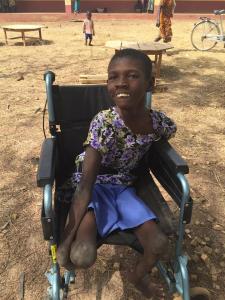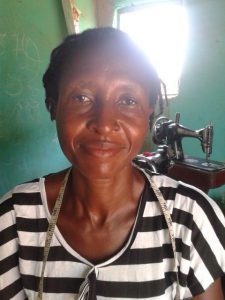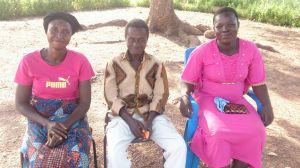Peace’s daughter, Blessing, was just two years old when she started having convulsions. Over time the full extent of Blessing’s disabilities became apparent. They visited many hospitals over the next few years and Peace became increasingly engaged in Blessing’s care, who at twenty years old is unable to talk, walk or feed herself. Visits to see specialists in more and more distant hospitals became increasingly difficult to finance and options for residential care were both inadequate and unaffordable.
Peace is restrained in discussing the challenges of managing the care needs of her daughter whilst raising her three other children and caring for the five older children by her husband’s first marriage. Peace bears the difficulties she has faced in her life with a great amount of dignity. She explains that now the children are grown, they all pull together to help and her burden is lessened, but when they were younger she had no option but to stay at home full time. She found it difficult to go out to sell in the market as people simply stopped buying from her when they discovered her daughter’s condition. The stigma surrounding disability, particularly in deprived areas such as Lawra District in the Upper Western Region of Ghana is still very strong, though Peace is careful not to go into detail or pass judgement on people’s beliefs or treatment of her and her daughter.
Since being referred to ATE’s Special Needs Awareness Programme (SNAP), Peace has been attending SNAP meetings every month for two years. Peace feels that SNAP has also been immensely helpful as staying at home with her disabled child was incredibly isolating. At times, she says that she used to find herself sitting alone and weeping, or find herself walking aimlessly not knowing where she was going. Her doctor advised her to socialise, open up and talk about the challenges she faces. Through SNAP, Peace has met other people in a similar situation, she saw that she was not alone and realised that some families struggle to care for children with even more profound disabilities than Blessing. She’s made a lot of friends through the group and now she says that when she goes to town people call to her from all over the market to greet her.
Through the educational SNAP workshops Peace says she has learnt a lot about taking care of herself and her daughter’s health and hygiene, how to interact with Blessing and help her to have a fuller life. Peace explains that because Blessing cannot walk, she didn’t used to give her any exercise and because she cannot talk, she didn’t used to communicate with her. Now she tells her when it is meal time or bath time and she can see that Blessing expresses sheer delight, particularly when she is coming to SNAP where she gets to socialise and has her own friends. Peace can see a lot of changes in her daughter. The smile on Blessing’s face at SNAP meetings speaks volumes about how important this group is to her and the families who attend on a regular basis. The ATE support provided through SNAP together with the small business grant have made a positive impact on Peace and Blessing’s lives and for this Peace is very grateful. #LeaveNooneBehind
By Leela Shanti


